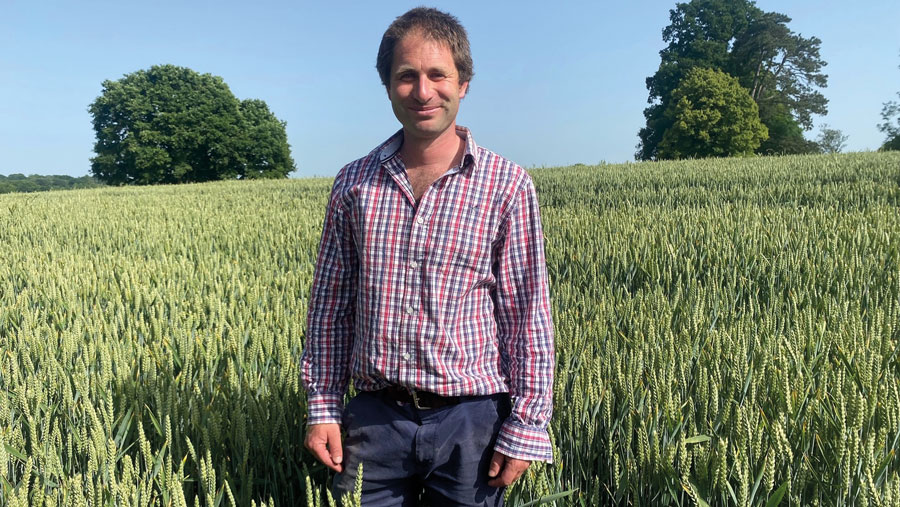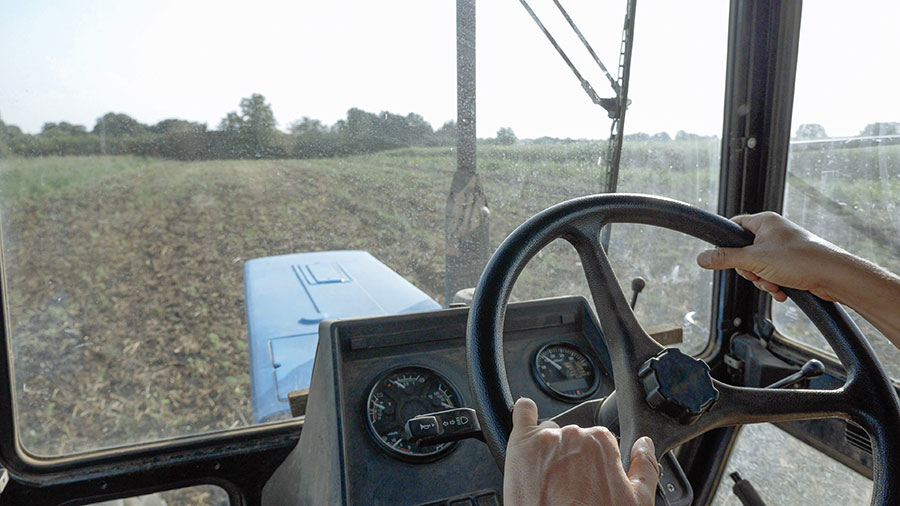Farming careers: From tractor driver to assistant farm manager
 © Simon Little
© Simon Little Simon Little, 35, is the assistant farm manager of the arable enterprise on a 3,000-acre mixed estate in East Sussex.
From a non-farming background, Simon took a summer job carting corn for a local contractor when he was 17 and went on to work for several other businesses to gain experience.
In 2008, he started working on this estate as a tractor driver when his current boss – who Simon had previously worked for at a different company – offered him a job.
See also: Farming careers: Working as a dairy herdsperson
A few years later Simon completed an MSc in farm and agri-business management at Harper Adams University.
In 2018, he was promoted to the management role, looking after the arable work full-time as well as continuing with practical field work.
Simon has since become Basis-qualified, after attending courses two days a fortnight in Essex for about four months, a lot of studying, and passing written exams.
This has provided huge benefits because it means he can take control of the crop protection products and cropping decisions himself rather than using an external agronomist, and enables him to spot potential problems before they become too serious.
There are about 12 employees working in the business, mostly on the dairy side, with one full-time employee and a student being managed by Simon.
He has had no formal staff management training, instead picking it up as he goes.
Depending on the season, his daily work includes making decisions about cropping, rotations and protection products and implementing those, looking after crops and grass, and feeding stock.
During spring, summer and autumn, Simon works 12 to 14 hours a day every day – depending on the weather – while the winter is less intensive, about seven to eight hours a day.
In quieter times, he also attends industry events and builds up his Continuing Professional Development (CPD) points.
“The best part of the job is being in the tractor or outside and being able to stop and look at how beautiful where we are is and having that as my office,” Simon said.
“There is a lot of satisfaction because all the work you put in is worth it when it comes to fruition.”
Looking ahead, Simon’s experience and qualifications mean he could pursue either the agronomy or farm management path.
“The agronomy route would offer a bit more stability and be less demanding in terms of it being set hours, and I really enjoyed studying for Basis, gaining more knowledge and having my eyes opened more to that part of the sector,” he said.
“With farm management, my MSc from Harper means I know about that side as well, so I have options.”
Tractor driver job profile

© Adobe Stock
What does the job involve?
Carrying out all field operations around arable crop production, maintaining safety standards and protocols, minimising risk, recording and managing data.
What qualifications/experience are needed?
Initially just tractor driving experience, building to telescopic handler, sprayer and combine-driving experience.
How can you gain the necessary qualifications/experience?
Through agricultural colleges or training bodies for proficiency tests. A supportive employer would pay to train and develop their staff.
What apprenticeships are available?
In England, there is the general agriculture apprentice scheme.
There is also a range of courses at agricultural colleges such as tractor driving and basic maintenance, or certificate of competence in tractor driving and related operations.
What are the benefits of this job?
Working outdoors, varied tasks, practical and technical skills combined with machine and systems technology.
What is a typical salary?
Maybe start at £20,000, progressing to £40-£50,000 with a house for top spec.
How can you progress in this role?
Gain qualifications and experience, perhaps by moving to different businesses. Consider moving into farm management.
How can employers best manage and maintain staff for this role?
Offer work-life balance, good pay, and high-quality equipment and working environment.
Source: Philip Dolbear, AHDB senior arable knowledge exchange manager
